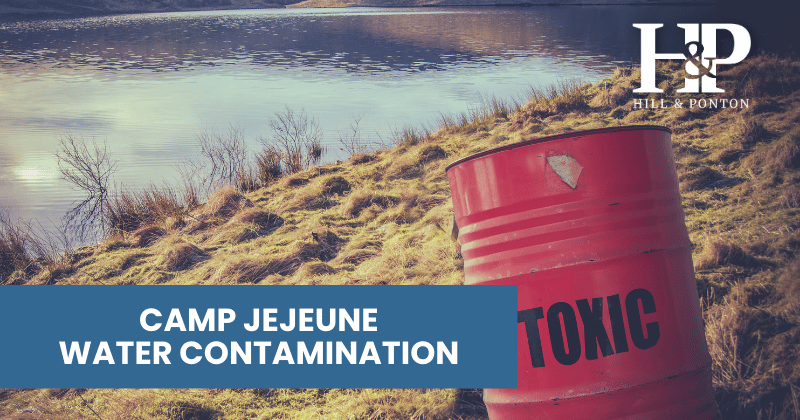U.S. Marine Corps Base Camp Lejeune is an east coast military base in Jacksonville, North Carolina. It’s currently part of a combined installation with Marine Corps Air Station New River. The training facilities are situated on miles of beach between the deep water ports Morehead City and Wilmington. The base is home to Marine expeditionary forces and other units.
Between the early 1950s and late 1980s, individuals at MCB camp Lejeune were exposed to toxic chemicals in drinking water in both the residential and training areas.
Veterans who were present at Camp Lejeune during this time period who later developed specific diseases may be eligible for disability compensation.
2022 Update: Honoring Our PACT Act of 2022
The most recent update on Camp Lejeune support has come in the form of the Honoring Our PACT Act of 2022, which was signed into law by the President on August 8, 2022.
This bill offers benefits to Veterans of Camp Lejeune in through the following section:
“An individual, including a veteran (as defined in section 101 of title 38, United States Code), or the legal representative of such an individual, who resided, worked, or was otherwise exposed (including in utero exposure) for not less than 30 days during the period beginning on August 1, 1953, and ending on December 31, 1987, to water at Camp Lejeune, North Carolina, that was supplied by, or on behalf of, the United States may bring an action in the United States District Court for the Eastern District of North Carolina to obtain appropriate relief for harm that was caused by exposure to the water at Camp Lejeune.”
section 804: Federal Cause of Action Relating to Water at Camp Lejeune, North Carolina
Our team at Hill and Ponton are here to help Veterans and their families. If you or your family were affected by the water at Camp Lejeune, contact us today for assistance.
Diagnosed Conditions Found from Camp Lejeune Water Contamination
Beyond the conditions that the VA explicitly lists for VA Benefit qualifications, many exposed to the contaminated water at Camp Lejeune (veteran’s family included) also experienced the following conditions which may quality for the Camp Lejeune lawsuit eligibility under the Honoring Our PACT Act.
- Aplastic anemia
- Bladder cancer
- Breast cancer
- Diabetes
- Esophageal cancer
- Female infertility
- Hepatic steatosis (fatty liver disease)
- Kidney cancer
- Leukemia
- Liver cancer
- Lung cancer
- Miscarriage
- Multiple myeloma
- Myelodysplastic syndromes
- Neurobehavioral effects
- Non-Hodgkin’s lymphoma
- Parkinson’s disease
- Renal toxicity
- Scleroderma
- Cardiac defects
- End stage renal disease
- Kidney disease
- Oral cleft defect
- Soft tissue sarcoma
Camp LeJeune Water Contamination Explained
Over 1 million military personnel and their family members were stationed at the United States Marine Corps Base Camp Lejeune in North Carolina between 1953 and 1987.
During this time, the people living on the base, military service members, and civilians, ingested contaminated drinking water and bathed in water that had been contaminated with chemicals from the base water treatment facilities and an off-base dry cleaning company in the local area.
The Tarawa Terrace and Hadnot Point water treatment plants were among those in question. Personnel were exposed to over 3,000 times the safe exposure limits of toxic chemicals.
What Areas of the Base are Affected?
How Did these Contaminants Get into the Water?
The primary contamination sources were from leaking storage tanks and industrial activities. It is estimated that the contaminants were in the water supply from the mid-1950’s until February 1985.
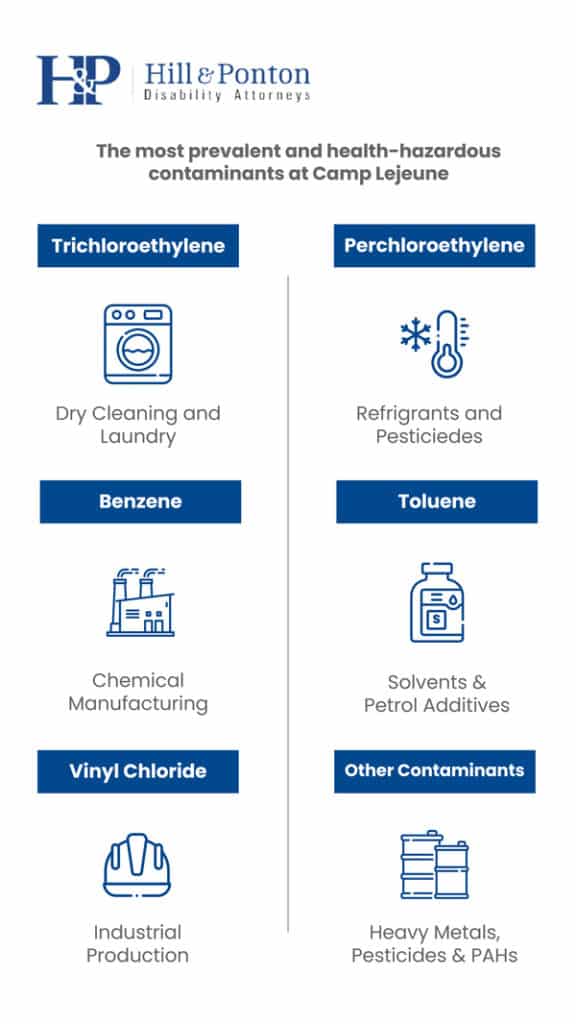
What Were the Contaminants at Camp Lejeune?
Volatile organic compounds, or VOCs, are the chemicals that caused the contamination. There were two main VOCs initially identified in Camp Lejeune’s water supply, a dry cleaning solvent, and a degreaser.
However, later studies showed that there were upwards of 70 other chemicals in the water that caused health risks.
The most prevalent and health-hazardous contaminants found were:
- Trichloroethylene and Perchloroethylene
- Benzene
- Toluene
- Vinyl Chloride
- Other Contaminants
Trichloroethylene and Perchloroethylene
Studies show that TCE and PCE can raise the risk of several cancers, including kidney and liver cancers and some support for Hodgkin’s disease and non- Hodgkin’s lymphoma.
There is also a possible association of cervical cancer with TCE exposure. Some data suggest associations between TCE exposure and multiple myeloma and prostate, laryngeal, and colon cancers.
There is support for an association between dry cleaning and laundry work (which typically utilize TCE and PCE) and kidney, pancreatic, cervical, esophageal, and lung cancers, and some support for bladder, prostate and colon cancers.
Benzene
Benzene is listed as a carcinogen, and typically promotes both acute myeloid leukemia (AML) and chronic lymphocytic leukemia (CLL), as well as multiple myeloma and non-Hodgkin lymphoma.
Toluene
Studies of workers exposed to toluene show an increase in cancer of the lung, breast, esophagus, stomach, colon, and especially the Rectum.
In addition, increases in lymphosarcoma, lympholeukaemia and Hodgkin’s and non-Hodgkin’s lymphoma have been seen in workers exposed to toluene.
Vinyl Chloride
I’ve discussed vinyl chloride in burn pits and its relation to cancer in previous posts. Exposure to vinyl chloride can cause up to five times higher rates of liver cancer, angiosarcoma, and lung cancer.
Other Contaminants
While the above toxins were measured in the highest quantities in the water at camp Lejeune, many other toxins were measured that are highly carcinogenic.
Some of these include heavy metals, pesticides, assorted polycyclic aromatic hydrocarbons (PAHs), and others. If there is no research connecting your particular cancer to exposure from the above toxins, there still may be research to support a connection.
Is the Water at Camp Lejeune Safe to Drink Now?
According to the United States Marine Corps, the water at Camp Lejeune is safe to drink today. The water around the base has been checked quarterly, and has been found to be contaminate free since March 1987.
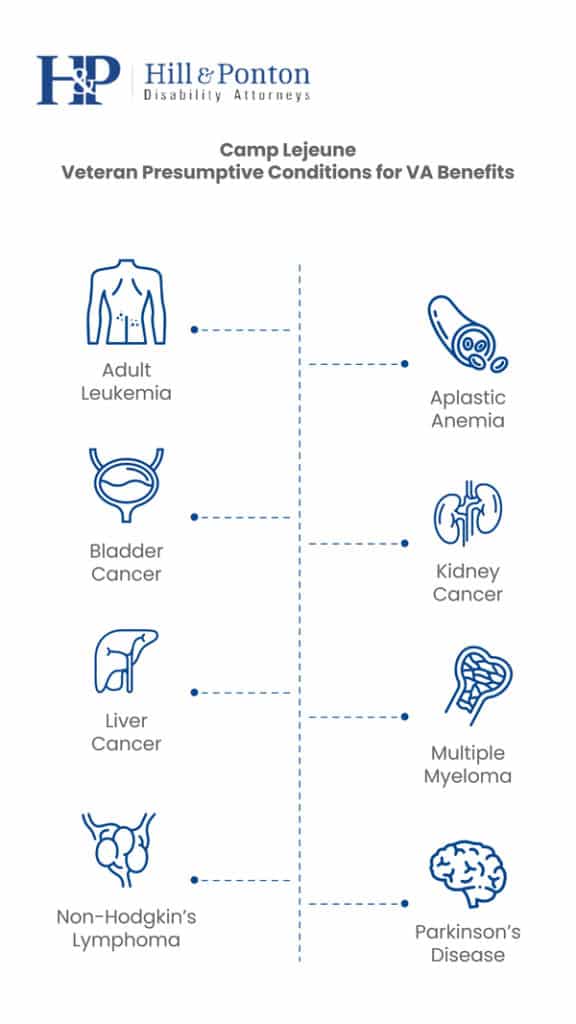
What Presumptive Conditions are Eligible for Benefits?
Veteran Presumptive Conditions for VA Benefits
The following eight conditions are considered presumptive for veterans (including reservists and National Guard) who were stationed at Camp Lejeune between August 1, 1953, and December 31, 1987, for a minimum of 30 days.
- Adult leukemia
- Aplastic anemia and other myelodysplastic syndromes
- Bladder cancer
- Kidney cancer
- Liver cancer
- Multiple myeloma
- Non-Hodgkin’s lymphoma
- Parkinson’s disease
Presumptive means the veteran only needs to prove being stationed at Camp Lejeune during the timeframes noted and for the minimum number of days to receive disability benefits by the Department of Veterans Affairs.
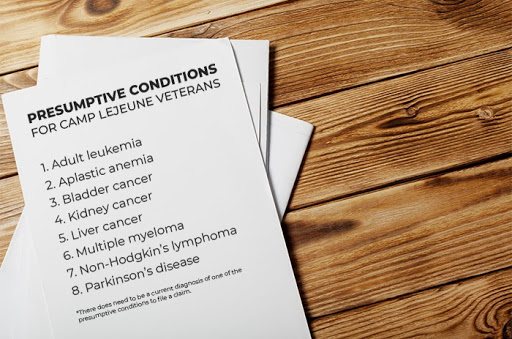
Although there does not need to be evidence of an in-service injury, treatment, or condition, A veteran does need to have a current diagnosis of one of the presumptive conditions to file a claim.
Presumptive Conditions for Healthcare for Veterans and Family Members
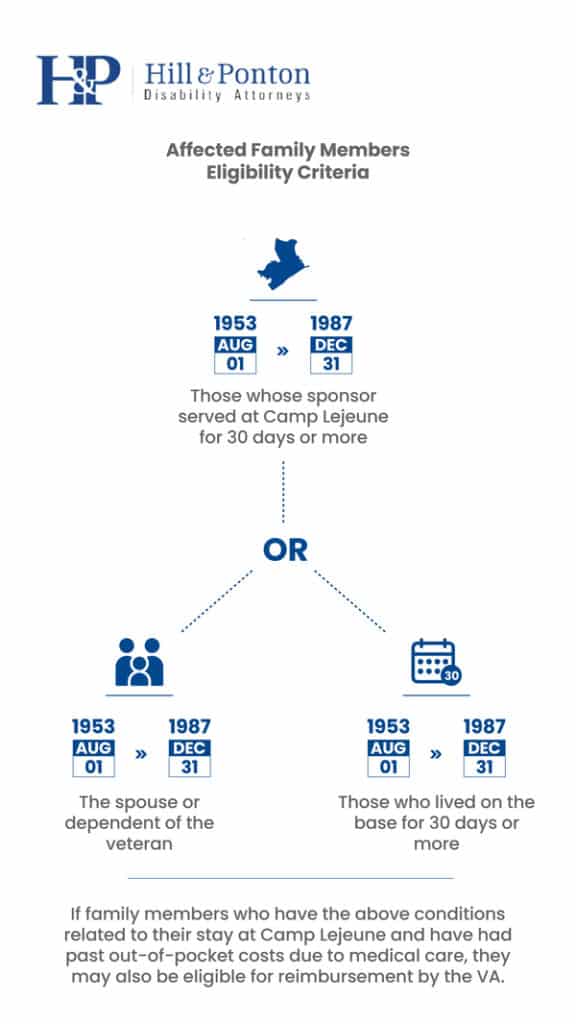
In accordance with the 2012 Camp Lejeune health care law, Veterans and family members can also receive free healthcare for 15 additional presumptive conditions.
These health problems and conditions do not qualify for presumptive disability compensation, although veterans with the following health conditions are encouraged to file a claim even if the condition is not presumptive due to the links to the toxins.
The conditions include:
- Esophageal cancer
- Breast cancer
- Kidney cancer
- Multiple myeloma
- Renal toxicity
- Female infertility
- Scleroderma
- Non-Hodgkin’s lymphoma
- Lung Cancer
- Bladder cancer
- Leukemia
- Myelodysplastic Syndromes
- Hepatic steatosis
- Miscarriage
- Neurobehavioral effects
- Diabetes
If family members who have the above conditions related to their stay at Camp Lejeune and have had past out-of-pocket costs due to medical care (not covered by healthcare such as co-pays or deductibles), they may also be eligible for reimbursement by the VA (family members only). Camp Lejeune diabetes related cases are also considered for reimbursement.
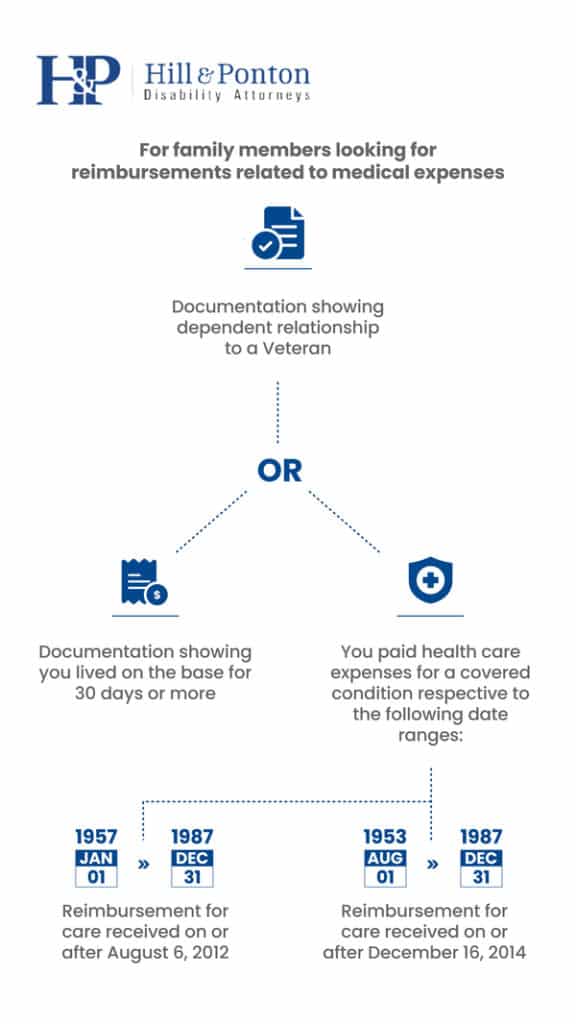
Qualifying family members include:
- Those whose sponsor (the qualifying veteran) was on active duty and served at Camp Lejeune for 30 days or more between August 1, 1953, and December 31, 1987
- The spouse or dependent of the veteran during the same period
- Those who lived on the base for 30 days or more between the same dates.
This includes the infants born of women pregnant on the base during this period (in-utero benefits).
There are eight presumptive conditions for disability compensation for Camp Lejeune veterans. They are:
- Adult leukemia
- Aplastic anemia and other myelodysplastic syndromes
- Bladder cancer
- Kidney cancer
- Liver cancer
- Multiple myeloma
- Non-Hodgkin’s lymphoma
- Parkinson’s disease
What Does This Mean for Veterans and their Families?
The VA Rule 38 CFR 3 effective March 14, 2017 (final rule), added certain presumptive diseases associated with the contaminants associated with Camp Lejeune. The rule also includes former reservists and National Guard members who were at the base for no less than 30 days during the presumptive period.
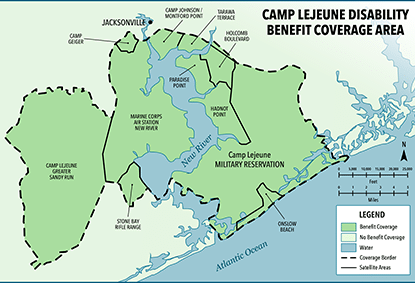
While there are no provisions for the seven conditions that are not presumptive for veterans for disability compensation, that does not mean that veterans should not file a claim for compensation.
The difference is that there will need to be medical evidence to show a link to the disability and the exposure to the toxins, which is not required for the 8 presumptive conditions.
Claims filed within one year of the rule or pending will, according to the VA, have an effective date of the ruling or the date of claim, whichever is earlier. Therefore, if a veteran files a claim before March 13, 2018, the effective date of their claim will be retroactive back to March 14, 2017.
Tips for Filing & Additional Resources
- Service personnel records (i.e., establishing that you served at Camp Lejeune during the specified period)
- VA medical records
- Compensation & Pension exam results
- Private medical records
- Lay statements
For family members looking for reimbursements related to medical expenses, the VA recommends you have the following evidence to submit with your application:
- Documentation showing dependent relationship to a Veteran who served at Camp Lejeune, such as marriage license or birth certificate
- Documentation showing you lived on the base for 30 days or more between Aug. 1, 1953 and Dec. 31, 1987 such as copies of orders or base housing records
- You paid health care expenses for a covered condition respective to the following date ranges.
- If you lived on Camp Lejeune between January 1, 1957 and December 31, 1987, then you can be reimbursed for care that you received on or after August 6, 2012
- If you lived on Camp Lejeune between August 1, 1953 and December 31, 1956, then you can be reimbursed for care that you received on or after December 16, 2014
